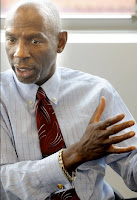Because of America's long history of institutionalized inequity, we have created a hard-core culture of poverty which is a severe affliction to its poor participants. Those who circulate in well-heeled suburban circles may not see this culture, since it tends to be more common in the urban ghetto than in spit-polished suburbs. The culture of poverty isn't synonymous with race. Poor white Appalachian families are as affected as poor ghetto blacks.
We do not need a justification to end the culture of poverty beyond liberating the people who are mired in it. The difficult question is, "How?" Geoffrey Canada and the Harlem Children's Zone (HCZ) program may have found a 'micro-environmental' solution.
HCZ attempts to provide a comprehensive solution within a defined area of Harlem. Canada determined that poor families there lack most of the services that make middle-class culture more productive: better parenting, better early childhood education, better schools at each level, access to medical care, and so on. The HCZ program begins with Baby College, a child raising class. Participants are recruited with street level outreach.
Baby College addresses the first barriers that children encounter as the grow up. Culture of poverty parents do not talk to their children a lot. They do not read to their children. Children hear an overwhelming preponderance of discouraging phrases as they grow up, and few positive ones. Children born into the culture of poverty will not (usually) develop the essential verbal and personality skills that a high volume of happy chatter between the parent and child encourages. They will hear far fewer words spoken, and many of the words they hear will be negative instruction: shut up, sit down, get away from that, stop that, and so on. In Baby College parents are taught to read to their children frequently, and to engage in continual positive and instructive conversation with their children.
Other parts of the program include medical/dental care, all-day pre-school programs, kindergarten, extended day charter schools. community centers, and college success programs. In other words, they give children the kind of stimulation which middle class children find critical to their much higher rates of success in life.
It isn't entirely clear how successful HCZ is going to be in overcoming the culture of poverty. There are other players in the game such as the economy, classism, and racism. But so far the results far exceed the success rates of most social remediation programs.
Harlem Children's Zone is a good example of a program which might be deemed reformist (however progressive it is). Some leftists dismiss such programs as mere tinkering with the sinking ship. The reason why it is important for radicals to pay attention is that 'the revolution' is not going to sweep away all inherited defects of capitalist society. The victims of capitalism will need healing and rehabilitation after the revolution in order to fully participate in the new society. Having some idea of what works can hardly be a disadvantage.
Saturday, September 5, 2009
Subscribe to:
Posts (Atom)


